Anansi Boys, Neil Gaiman
I have a bad habit of buying an excessive number of books all at once and then going out and buying more books before I finish those I’ve already purchased. It’s a problem. Well, its a problem for my bank account, probably, and it’s definitely becoming a problem finding enough space in my apartment for more bookshelves, but I honestly don’t think it’s a bad life choice. I always have books around that I haven’t read yet, and that’s important to me.
I’ve always felt like books have a life of their own. The physical books, I mean, not the text inside of them (which, of course, has a life of its own as well — but that’s a discussion for another time). Books find their way into our lives and their histories are written in the creases on their bindings and in their scent when you open them. We find them at just the right time or sometimes they wait on the shelf unread until it’s just the right moment. Until you know that it’s time to pick them up and finally read them.
Well, Anansi Boys was one of those books for me. I bought it right after I’d finished American Gods, when I went a little crazy and bought as many of Gaiman’s books as I could find. Then it sat on my shelf for three years until last Saturday when my cat knocked it off the bookshelf onto the floor. I’m not one to ignore a sign when I see it, so I promptly picked it up and sat it on my bedside table to begin reading that night — and what a good choice that was.
 As always, Gaiman delivers a riveting plotline with diverse and well developed characters. Anansi Boys is neither as densely rich as American Gods nor as riotously funny as Good Omens, but it has a Kafkaesque charm all its own. The story is complex without being overly complicated and it had me giggling right from the start. It follows Fat Charlie Nancy as he deals with his father’s death and meets his brother, Spider, for the first time. Of course, Fat Charlie’s father is a god, so things are a mite bit more complicated than Fat Charlie imagined they would be (though he deals with his struggles far better than any of Kafka’s characters ever managed to). Between magic and coincidence (if there is such a thing), Fat Charlie finds himself on the adventure of his life, and brings the reader right along with him.
As always, Gaiman delivers a riveting plotline with diverse and well developed characters. Anansi Boys is neither as densely rich as American Gods nor as riotously funny as Good Omens, but it has a Kafkaesque charm all its own. The story is complex without being overly complicated and it had me giggling right from the start. It follows Fat Charlie Nancy as he deals with his father’s death and meets his brother, Spider, for the first time. Of course, Fat Charlie’s father is a god, so things are a mite bit more complicated than Fat Charlie imagined they would be (though he deals with his struggles far better than any of Kafka’s characters ever managed to). Between magic and coincidence (if there is such a thing), Fat Charlie finds himself on the adventure of his life, and brings the reader right along with him.
The story is ultimately one about Charlie finding himself, embracing his heritage, and learning to live his life on his own terms and no one else’s. And, speaking as a woman who’s just about to hit a quarter of a century and is genuinely freaking out about it, it was the perfect time for a gentle reminder about taking control of my own life. Anansi Boys is absolutely worth a read if you have the chance!
Recent Comments